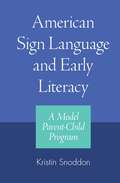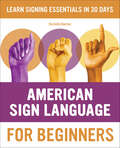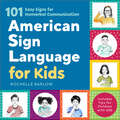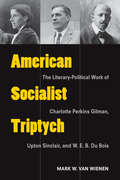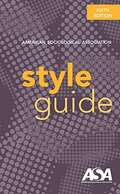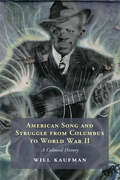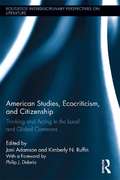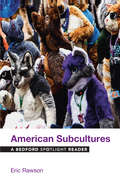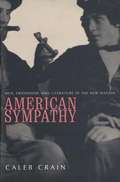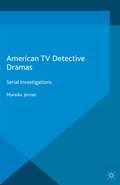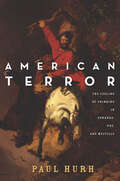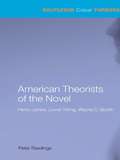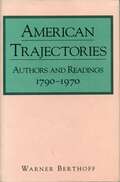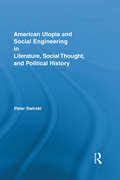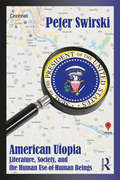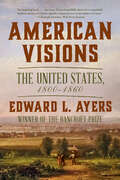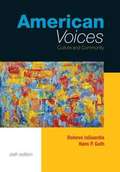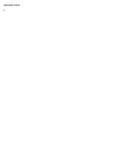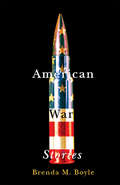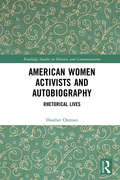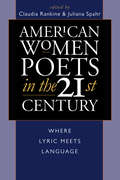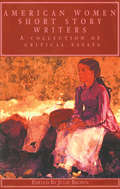- Table View
- List View
American Sign Language and Early Literacy: A Model Parent-Child Program
by Kristin SnoddonThe usual definition of the term "literacy" generally corresponds with mastering the reading and writing of a spoken language. This narrow scope often engenders unsubstantiated claims that print literacy alone leads to, among other so-called higher-order thinking skills, logical and rational thinking and the abstract use of language. Thus, the importance of literacy for deaf children in American Sign Language (ASL) is marginalized, asserts author Kristin Snoddon in her new book American Sign Language and Early Literacy: A Model Parent-Child Program. As a contrast, Snoddon describes conducting an ethnographic, action study of the ASL Parent-Child Mother Goose program, provided by a Deaf service agency in Ontario, Canada to teach ASL literacy to deaf children. According to current scholarship, literacy is achieved through primary discourse shared with parents and other intimates, which establishes a child's initial sense of identity, culture, and vernacular language. Secondary discourse derives from outside agents and interaction, such as expanding an individual's literacy to other languages. Snoddon writes that the focus of the ASL Parent-Child Mother Goose program is on teaching ASL through rhymes and stories and some facets of the culture of Deaf ASL users. This focus enabled hearing parents to impart first-language acquisition and socialization to their deaf children in a more natural primary discourse as if the parents were Deaf themselves. At the same time, hearing parents experience secondary discourses through their exposure to ASL and Deaf culture. Snoddon also comments on current infant hearing screening and early intervention and the gaps in these services. She discusses gatekeeper individuals and institutions that restrict access to ASL for young Deaf children and their families. Finally, she reports on public resources for supporting ASL literacy and the implications of her findings regarding the benefits of early ASL literacy programming for Deaf children and their families.
American Sign Language for Beginners: Learn Signing Essentials in 30 Days
by Rochelle BarlowA 30-day beginner's guide for learning American Sign LanguageThere's an easy way to leap right in to learning American Sign Language (ASL). American Sign Language for Beginners delivers 30 days of lessons that will help you sign with those in your home, community, and classroom.From letters and numbers to essential vocabulary and grammar basics, this beginner's guide provides the essentials needed to develop a solid foundation for American Sign Language in the real world. Each daily lesson takes less than 30 minutes to complete and focuses on a single set of vocabulary or ASL grammar. Throughout the course, you'll find key phrases, helpful memory tips, signing practice activities, and insight into deaf culture. Start your ASL masterclass today.American Sign Language for Beginners includes:30 Days of easy ASL—Start off right with an accelerated plan designed to help you begin signing in just one month.Easy-to-understand instructions—Lessons concentrate on a single idea or subject and include photographs to demonstrate signs.Everyday phrases—Daily instruction highlights vocabulary you're most likely to need as you explore ASL in your daily life.Jump-start your learning experience with American Sign Language for Beginners!
American Sign Language for Kids: 101 Easy Signs for Nonverbal Communication
by Rochelle BarlowThe easy way for kids ages 3 to 6 (and parents) to learn American Sign LanguageThere has never been a better way to start learning American Sign Language. Ideal for parents of nonverbal children or children with communication impairments in the preschool or kindergarten age range, American Sign Language for Kids offers a simple way to introduce both of you to ASL.Build your vocabularies with 101 signs perfect for everyday use, all featuring detailed illustrations, memory tips, and hands-on activities. American Sign Language for Kids helps you focus on the types of words you need most with chapters conveniently divided by category. Get chatty with activities that guide you through conversations. You'll be signing together in no time!American Sign Language for Kids includes:101 Helpful signs—From family and feelings to meals and playtime, work with your child to master subjects that will help the two of you connect.Fun ways to practice—Discover enjoyable activities at the end of each section that make it exciting and engaging to learn signs and start conversing!Practical guides—Get useful advice for introducing signs to a child with autism, helpful primers on deaf culture, and more.Discover an effective and meaningful way to deepen communication with your child—American Sign Language for Kids shows you the way.
American Socialist Triptych: The Literary-Political Work of Charlotte Perkins Gilman, Upton Sinclair, and W. E. B. Du Bois
by Van Wienen Mark W."A meticulously researched, highly informed, carefully argued, and very accessible account of American socialism, socialists, and socialistic thinking, from the late nineteenth century through the 1960s . . . challenges the intellectual and political legacy of Werner Sombart'sWhy Is There No Socialism in the United States?, whose spirit still hovers over animated discussions about the 'failures' of socialism in the United States. " ---James A. Miller, George Washington University "A valuable rethinking and reframing of the traditions of leftist literary scholarship in the U. S. " ---Sylvia Cook, University of Missouri, St. Louis American Socialist Triptych: The Literary-Political Work of Charlotte Perkins Gilman, Upton Sinclair, and W. E. B. Du Boisexplores the contributions of three writers to the development of American socialism over a fifty--year period and asserts the vitality of socialism in modern American literature and culture. Drawing upon a wide range of texts including archival sources, Mark W. Van Wienen demonstrates the influence of reform-oriented, democratic socialism both in the careers of these writers and in U. S. politics between 1890 and 1940. While offering unprecedented in-depth analysis of modern American socialist literature, this book charts the path by which the supposedly impossible, dangerous ideals of a cooperative commonwealth were realized, in part, by the New Deal. American Socialist Triptychprovides in-depth, innovative readings of the featured writers and their engagement with socialist thought and action. Upton Sinclair represents the movement's most visible manifestation, the Socialist Party of America, founded in 1901; Charlotte Perkins Gilman reflects the socialist elements in both feminism and 1890s reform movements, and W. E. B. Du Bois illuminates social democratic aspirations within the NAACP. Van Wienen's book seeks to re-energize studies of Sinclair by treating him as a serious cultural figure whose career peaked not in the early success ofThe Junglebut in his nearly successful 1934 run for the California governorship. It also demonstrates as never before the centrality of socialism throughout Gilman's and Du Bois's literary and political careers. More broadly,American Socialist Triptychchallenges previous scholarship on American radical literature, which has focused almost exclusively on the 1930s and Communist writers. Van Wienen argues that radical democracy was not the phenomenon of a decade or of a single group but a sustained tradition dispersed within the culture, providing a useful genealogical explanation for how socialist ideas were actually implemented through the New Deal. American Socialist Triptychalso revises modern American literary history, arguing for the endurance of realist and utopian literary modes at the height of modernist literary experimentation and showing the importance of socialism not only to the three featured writers but also to their peers, including Edward Bellamy, Hamlin Garland, Jack London, Edna St. Vincent Millay, and Claude McKay. Further, by demonstrating the importance of social democratic thought to feminist and African American campaigns for equality, the book dialogues with recent theories of radical egalitarianism. Readers interested in American literature, U. S. history, political theory, and race, gender, and class studies will all find inAmerican Socialist Triptycha valuable and provocative resource.
American Sociological Association Style Guide
by American Sociological AssociationThe sixth edition of the ASA Style Guide is the authoritative reference for writing, submitting, editing, and copy editing manuscripts for ASA journals and other publications following ASA's unique format. This revised, updated edition features guidelines for the most common situations encountered by authors and editors. New features include revisions to reference formatting and additional information on grammar, as well as expanded information on the use of electronic , digital, and social media sources. The sixth edition also includes guidance for online manuscript submissions, preprints, and updated reference examples. Coil binding. 163 pages, March 2019.
American Sociological Association Style Guide (Fifth Edition)
by American Sociological AssociationThe ASA Style Guide highlights and features guidelines for the most common situations encountered by authors and editors in the ASA journal publication process. It is designed to serve as the authoritative reference for writing, submitting, editing, and copy editing manuscripts for ASA journals. The Guide also serves a wider community of researchers, writers, and pub¬lishers who use it to prepare and present scholarly papers in other sociological and social science venues.
American Song and Struggle from Columbus to World War 2: A Cultural History
by Will KaufmanLong before anyone ever heard of 'protest music', people in America were singing about their struggles. They sang for justice and fairness, food and shelter, and equality and freedom; they sang to be acknowledged. Sometimes they also sang to oppress. This book uncovers the history of these people and their songs, from the moment Columbus made fateful landfall to the start of the Second World War, when 'protest music' emerged as an identifiable brand. Cutting across musical genres, Will Kaufman recovers the passionate voices of America itself. We encounter songs of the mainland and the conquered territories of Hawai'i, Cuba, Puerto Rico, and the Philippines; we hear Indigenous songs, immigrant songs and Klan songs, minstrel songs and symphonies, songs of the heard and the unheard, songs of the celebrated and the anonymous, of the righteous and the despicable. This magisterial book shows that all these songs are woven into the very fabric of American history.
American Studies, Ecocriticism, and Citizenship: Thinking and Acting in the Local and Global Commons (Routledge Interdisciplinary Perspectives on Literature)
by Philip J. Deloria Joni Adamson Kimberly N. RuffinThis collection reclaims public intellectuals and scholars important to the foundational work in American Studies that contributed to emerging conceptions of an "ecological citizenship" advocating something other than nationalism or an "exclusionary ethics of place." Co-editors Adamson and Ruffin recover underrecognized field genealogies in American Studies (i.e. the work of early scholars whose scope was transnational and whose activism focused on race, class and gender) and ecocriticism (i.e. the work of movement leaders, activists and scholars concerned with environmental justice whose work predates the 1990s advent of the field). They stress the necessity of a confluence of intellectual traditions, or "interdisciplinarities," in meeting the challenges presented by the "anthropocene," a new era in which human beings have the power to radically endanger the planet or support new approaches to transnational, national and ecological citizenship. Contributors to the collection examine literary, historical, and cultural examples from the 19th century to the 21st. They explore notions of the common—namely, common humanity, common wealth, and common ground—and the relation of these notions to often conflicting definitions of who (or what) can have access to "citizenship" and "rights." The book engages in scholarly ecological analysis via the lens of various human groups—ethnic, racial, gendered, coalitional—that are shaping twenty-first century environmental experience and vision. Read together, the essays included in American Studies, Ecocriticism, and Citizenship create a "methodological commons" where environmental justice case studies and interviews with activists and artists living in places as diverse as the U.S., Canada, Haiti, Puerto Rico, Taiwan and the Navajo Nation, can be considered alongside literary and social science analysis that contributes significantly to current debates catalyzed by nuclear meltdowns, oil spills, hurricanes, and climate change, but also by hopes for a common future that will ensure the rights of all beings--human and nonhuman-- to exist, maintain, and regenerate life cycles and evolutionary processes
American Subcultures: A Bedford Spotlight Reader
by Eric RawsonAlthough its subject is American society, this book offers a collection of texts that will stimulate critical thinking and frame opportunities for meaningful writing in general. American Subcultures provides you with several exciting opportunities: to develop a sound writing process appropriate to the argumentative and analytical nature of academic writing; to learn critical thinking and reading skills; to investigate and express personal values; and to master interdisciplinary and versatile forms of written communication. The design of this book is predicated on the notion that good writers, like good students, are made, not born. There is nothing innate about the ability to write well. Strong writing — or academic success in general — results from dedication, curiosity, engagement, and effort. Writing can — and should — be a means of discovery, of generating knowledge, rather than merely an instrument for repackaging and disseminating information. We write to learn rather than merely learn to write.
American Sympathy: Men, Friendship and Literature in the New Nation
by Caleb Crain"A friend in history", Henry David Thoreau once wrote, "looks like some premature soul". And in the history of friendship in early America, Caleb Crain sees the soul of the nation's literature. In a sensitive analysis that weaves together literary criticism and historical narrative, Crain describes the strong friendships between men that supported and inspired some of America's greatest writing -- the Gothic novels of Charles Brockden Brown, the essays of Ralph Waldo Emerson, and the novels of Herman Melville. He traces the genealogy of these friendships through a series of stories. A dapper English spy inspires a Quaker boy to run away from home. Three Philadelphia gentlemen conduct a romance through diaries and letters in the 1780s. Flighty teenager Charles Brockden Brown metamorphoses into a horror novelist by treating his friends as his literary guinea pigs. Emerson exchanges glances with a Harvard classmate but sacrifices his crush on the altar of literature -- a decision Margaret Fuller invites him to reconsider two decades later. Throughout this engaging book, Crain demonstrates the many ways in which the struggle to commit feelings to paper informed the shape and texture of American literature.
American TV Detective Dramas: Serial Investigations (Crime Files)
by Mareike JennerThe way detectives access and attain the 'truth' about a crime is an important indicator of how they relate to contemporary political developments. This book explores these methods of detection and positions the genre in a specific political, aesthetic, narrative and industrial context.
American Terror: The Feeling of Thinking in Edwards, Poe, and Melville
by Paul HurhIf America is a nation founded upon Enlightenment ideals, then why are so many of its most celebrated pieces of literature so dark? American Terror returns to the question of American literature's distinctive tone of terror through a close study of three authors--Jonathan Edwards, Edgar Allan Poe, and Herman Melville--who not only wrote works of terror, but who defended, theorized, and championed it. Combining updated historical perspectives with close reading, Paul Hurh shows how these authors developed terror as a special literary affect informed by the way the concept of thinking becomes, in the wake of Enlightenment empiricism, increasingly defined by a set of austere mechanic processes, such as the scientific method and the algebraic functions of analytical logic. Rather than trying to find a feeling that would transcend thinking by subtending reason to emotion, these writers found in terror the feeling of thinking, the peculiar feeling of reason's authority over emotional schemes. In so doing, they grappled with a shared set of enduring questions: What is the difference between thinking and feeling? When we know something, how do we know that we know it? Why does it seem impossible to reason oneself out of an irrational fear? And what becomes of the freedom of the will when we discover that affects can push it around?
American Theorists of the Novel: Henry James, Lionel Trilling and Wayne C. Booth (Routledge Critical Thinkers)
by Peter RawlingsThe American theorists: Henry James, Lionel Trilling and Wayne C. Booth have revolutionized our understanding of narrative and have each championed the novel as an art form. Concepts from their work have become part of the fabric of novel criticism today, influencing theorists, authors and readers alike. Emphasizing the crucial relationship between the works of these three critics, Peter Rawlings explores their understanding of the novel form, and investigates their ideas on: realism and representation authors and narration point of view and centres of consciousness readers, reading and interpretation moral intelligence. Rawlings demonstrates the importance of James, Trilling and Booth for contemporary literary theory and clearly introduces critical concepts that underlie any study of narrative. American Theorists of the Novel is invaluable reading for anyone with an interest in American critical theory, or the genre of the novel.
American Trajectories: Authors and Readings, 1790–1970
by Warner BerthoffIn American Trajectories Warner Berthoff argues that even in the broadest cultural and historical perspective, imaginative literature (like all the arts) is a matter of individual signatures and differences. He also puts forth that there are recognizable patterns and continuities marking off what is distinctively American, what both reflects and speaks for a shared national experience. Discussions of Emily Dickinson and Mark Twain, Scott Fitzgerald and Ernest Hemingway, Kate Chopin, Theodore Dreiser, and Edmund Wilson focus on the provenance and central character of writing by mainstream figures in our literary past. The essays on Brockden Brown, Nathan Asch, O. Henry, Frank O'Hara, Lewis Mumford, and Van Wyck Brooks highlight marginal, neglected, forgotten, or not yet fully acknowledged contributors to American writing.
American Trajectories: Authors and Readings, 1790–1970 (G - Reference, Information and Interdisciplinary Subjects)
by Warner BerthoffIn American Trajectories Warner Berthoff argues that even in the broadest cultural and historical perspective, imaginative literature (like all the arts) is a matter of individual signatures and differences. He also puts forth that there are recognizable patterns and continuities marking off what is distinctively American, what both reflects and speaks for a shared national experience. Discussions of Emily Dickinson and Mark Twain, Scott Fitzgerald and Ernest Hemingway, Kate Chopin, Theodore Dreiser, and Edmund Wilson focus on the provenance and central character of writing by mainstream figures in our literary past. The essays on Brockden Brown, Nathan Asch, O. Henry, Frank O'Hara, Lewis Mumford, and Van Wyck Brooks highlight marginal, neglected, forgotten, or not yet fully acknowledged contributors to American writing.
American Utopia and Social Engineering in Literature, Social Thought, and Political History (Routledge Transnational Perspectives on American Literature)
by Peter SwirskiThe United States today is afflicted with political alienation, militarized violence, institutionalized poverty, and social agony. Worst of all, perhaps, it is afflicted with chronic and acute ahistoricism. America insist on ignoring the context of its present dilemmas. It insists on forgetting what preceded the headlines of today and on denying continuity with history. It insists, in short, on its exceptionalism. American Utopia and Social Engineering sets out to correct this amnesia. It misses no opportunity to flesh out both the historical premises and the political promises behind the social policies and political events of the period. These interdisciplinary concerns provide, in turn, the framework for the analyses of works of American literature that mirror their times and mores. Novels considered include: B.F. Skinner and Walden Two (1948), easily the most scandalous utopia of the century, if not of all times; Ken Kesey’s One Flew Over the Cuckoo’s Nest (1962), an anatomy of political disfranchisement American-style; Bernard Malamud’s God’s Grace (1982), a neo-Darwinian beast fable about morality in the thermonuclear age; Walker Percy’s The Thanatos Syndrome (1986), a diagnostic novel about engineering violence out of America’s streets and minds; and Philip Roth’s The Plot Against America (2004), an alternative history of homegrown ‘soft’ fascism. With the help of the five novels and the social models outlined therein, Peter Swirski interrogates key aspects of sociobiology and behavioural psychology, voting and referenda procedures, morality and altruism, multilevel selection and proverbial wisdom, violence and chip-implant technology, and the adaptive role of emotions in our private and public lives.
American Utopia: Literature, Society, and the Human Use of Human Beings
by Peter SwirskiFrom Black Tuesday to the White House, from Plato to Robert Nozick, from Eugene Debs to Richard Nixon, from Peter Cornelis Plockhoy to the hippie communes of the Sixties, from universal basic income to utopian basic income, from proverbial wisdom to multilevel selection, from Big Data to paleomorality, from Prisoner’s Dilemma to social-engineering Israeli kindergartens, from time travel to gene engineering, from the pretzel logic of meritocracy to deaggressing humanity, American Utopia maps the pitfalls and windfalls of social reform in the name of the human use of human beings. Interrogating the assumptions behind four outré utopias by Thomas M. Disch, Bernard Malamud, Kurt Vonnegut, and Margaret Atwood, the book interrogates the assumptions that have historically been central to the utopian project. Whence the seeds of social discontent? Whence our taste for egoism and altruism? For waging war and waging peace? Can we bioengineer human nature to specifications? Should we? Who makes better guardians: humans or machines? And who will guard the guardians?
American Vandal
by Roy MorrisUnintimidated by Old World sophistication or travel to undeveloped parts of the globe, Mark Twain spent a surprising amount of time outside the continental United States. Roy Morris, Jr. focuses on the dozen years he lived overseas and the books he wrote encouraging middle-class Americans to follow him around the world, at the dawn of mass tourism.
American Visions: The United States, 1800-1860
by Edward L. Ayers“An inspiring book.… American Visions beautifully shows how remarkably resilient dreams of a better republic remained even in the darkest of times.” —Christoph Irmscher, Wall Street Journal A revealing history of the formative period when voices of dissent and innovation defied power and created visions of America still resonant today. With so many of our histories falling into dour critique or blatant celebration, here is a welcome departure: a book that offers hope as well as honesty about the American past. The early decades of the nineteenth century saw the expansion of slavery, Native dispossession, and wars with Canada and Mexico. Mass immigration and powerful religious movements sent tremors through American society. But even as the powerful defended the status quo, others defied it: voices from the margins moved the center; eccentric visions altered the accepted wisdom, and acts of empathy questioned self-interest. Edward L. Ayers’s rich history examines the visions that moved Frederick Douglass, Margaret Fuller, the Native American activist William Apess, and others to challenge entrenched practices and beliefs. So, Lydia Maria Child condemned the racism of her fellow northerners at great personal cost. Melville and Thoreau, Joseph Smith and Samuel Morse all charted new paths for America in the realms of art, nature, belief, and technology. It was Henry David Thoreau who, speaking of John Brown, challenged a hostile crowd "Is it not possible that an individual may be right and a government wrong?" Through decades of award-winning scholarship on the Civil War, Edward L. Ayers has himself ventured beyond the interpretative status quo to recover the range of possibilities embedded in the past as it was lived. Here he turns that distinctive historical sensibility to a period when bold visionaries and critics built vigorous traditions of dissent and innovation into the foundation of the nation. Those traditions remain alive for us today.
American Voices: Culture and Community (Sixth Edition)
by Dolores Laguardia Hans P. GuthAmerican Voices: Culture and Community, Sixth Edition, is an 800 page Freshman English reader compiled and written by Dolores LaGuardia and Hans P. Guth. The authors' description of this edition reads as follows: This thematic reader addresses the diversity of American culture by featuring over 100 provocative readings and images from a broad range of authorial voices. American Voices: Culture and Community helps students read critically and develop their own voices with helpful apparatus for each reading and engaging forums and writing workshops at the end of each chapter. NEW TO THIS EDITION Over 40 New Readings. These new readings from a diverse group of authors are on such contemporary. high-interest topics as growing up between cultures. high-stakes testing for students. gay marriage, outsourcing. and terrorism. New Visual Literacy Thread. The first chapter introduces students to concepts of visual literacy and provides guides for different ways to think about visuals. Following this first chapter. each chapter begins with a visual literacy exercise. Expanded Writing Workshops. These self-contained units at the end of each chapter now feature more student writing with supportive comments. More Context for Readings. New expanded headnotes give students more contextual information for each reading, so students can think critically about purpose and audience. New "Other Voices" boxes. Throughout the book. new "Other Voices" give context and alternate views to the selections in t ie~rnfrofogy T+~es e _ s appear at the end of select readings. Now powered by eatalylst 2.0
American Voices: Literature
by Perfection LearningProvide your students a diverse set of texts, both classic and contemporary to probe relevant themes, develop literary analysis skills, and generate lively discussions. <p><p> The American Voices anthology supports common eleventh grade literature requirements and engages students using a literary lens for every selection. The Interactive Edition provides power digital tools to ensure text comprehension, build close reading skills, and increase collaboration.
American War Stories (War Culture)
by Brenda M. BoyleAmerican War Stories asks readers to contemplate what traditionally constitutes a “war story” and how that constitution obscures the normalization of militarism in American culture. The book claims the traditionally narrow scope of “war story,” as by a combatant about his wartime experience, compartmentalizes war, casting armed violence as distinct from everyday American life. Broadening “war story” beyond the specific genres of war narratives such as “war films,” “war fiction,” or “war memoirs,” American War Stories exposes how ingrained militarism is in everyday American life, a condition that challenges the very democratic principles the United States is touted as exemplifying.
American Women Activists and Autobiography: Rhetorical Lives (Routledge Studies in Rhetoric and Communication)
by Heather OstmanAmerican Women Activists and Autobiography examines the feminist rhetorics that emerge in six very different activists’ autobiographies, as they simultaneously tell the stories of unconventional women’s lives and manifest the authors’ arguments for social and political change, as well as provide blueprints for creating tectonic shifts in American society. Exploring self-narratives by six diverse women at the forefront of radical social change since 1900—Jane Addams, Emma Goldman, Dorothy Day, Angela Davis, Mary Crow Dog, and Betty Friedan—the author offers a breadth of perspectives to current dialogues on motherhood, essentialism, race, class, and feminism, and highlights the shifts in situated feminist rhetorics through the course of the last one hundred years. This book is a timely instructional resource for all scholars and graduate students in rhetorical studies, composition, American literature, women's studies, feminist rhetorics, and social justice.
American Women Poets in the 21st Century: Where Lyric Meets Language
by Juliana Spahr Claudia RankineA thought-provoking mix of poetry, creative manifesto and criticism.
American Women Short Story Writers: A Collection of Critical Essays (Wellesley Studies in Critical Theory, Literary History and Culture #Vol. 1737)
by Julie BrownThis collection of original and classic essays examines the contributions that female authors have made to the short story. The introductory chapter discusses why genre critics have ignored works by women and why feminist scholars have ignored the short story genre. Subsequent chapters discuss early stories by such authors as Lydia Maria Child and Rose Terry Cooke. Others are devoted to the influences (race, class, sexual orientation, education) that have shaped women's short fiction through the years. Women's special stylistic, formal and thematic concerns are also discussed in this study. The final essay addresses the ways our contemporary creative-writing classes are stifling the voices of emerging young female authors. The collection includes an extensive five-part bibliography.
